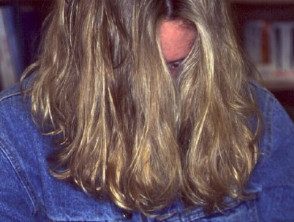Introduction
Acne can have profound psychological and social effects. These are not necessarily related to their clinical severity. Even mild acne can be significantly disabling. Acne can affect people of all ages, but it occurs predominantly during adolescence. Approximately 85% of people between the ages of 12 and 25 develop acne.
Acne response

Teen with acne
Than psychosocial What problems does acne cause?
The psychological and social impacts of acne are a major concern, especially since acne affects teens at a crucial time when they develop their personality. During this time, peer acceptance is very important to the adolescent and unfortunately it has been found that there are strong links between physical appearance and the attractiveness and status of peers.
In recent years, open discussions between patients and medical professionals have revealed the impact that acne has on the psyche. The following are some of the problems acne patients may face.
Self-esteem and body image
- Some embarrassed acne patients avoid eye contact.
- Some people with acne grow their hair long to cover the face. Girls tend to wear heavy makeup to disguise pimples, although they know that this sometimes exacerbates their acne. Boys often comment, "Acne is not a problem for girls because they can wear makeup."
- Trunc acne can reduce participation in sports such as swimming or rugby due to the need to undress in public locker rooms.
Social Retirement / Relationship Building
- Acne, especially when it affects the face, causes cruel teasing from other teens.
- Some find it difficult to form new relationships, especially the opposite sex.
- At a time when teens are learning to form relationships, people with acne may lack the self-confidence to go out and establish these bonds. They become shy and even lonely. The main concern is fear of negative valuation of others. In extreme cases a social phobia can develop.
Education / work
- Some children with acne refuse to go to school, leading to poor academic performance.
- Some people with acne take sick days from work, risking their jobs or livelihood.
- Acne can reduce career options, ruling out occupations like modeling that depend on personal appearance.
- Acne patients are less successful in applying for jobs; Your lack of confidence is as important as the reaction of potential employers to your blotchy skin.
- More people with acne are unemployed than people without acne.
- Many young adults with acne seek medical help when they enter the workforce, where they perceive that acne is unacceptable and that "they should be gone by now."
Evaluation of the impact of acne on the individual.
Tools that assess the impact of acne on psychosocial factors and quality of life can be used in clinical practice and in clinical trials. They include:
- APSEA: evaluation of the psychological and social effects of acne
- ADI: Acne Disability Index
- CADI: Cardiff Acne Disability Index
- AQOL: acne quality of life Scale
- Acne-QoL: Acne Quality of Life and Acne-Q4
Does acne cause depression?
In some patients, acne distress can lead to depression. This must be recognized and managed. Signs of depression include:
- Loss of appetite
- Lethargy
- Altered mood
- Behavior problems
- Wakefulness
- Spontaneous crying
- Feelings of unworthiness.
In teens, depression can manifest as social withdrawal (withdrawing to the bedroom or avoiding peers) or poor school performance (lower grades or missed assignments). Severe depression caused by acne has resulted in a suicide attempt and, unfortunately, a successful suicide. Worrying statements include: "I don't want to wake up in the morning"; "I'd be better off dead"; "I'm not worth anything"; "You would be better off without me." Parents, friends, and school counselors should pay attention when they begin to hear such comments.
Rarely, depression may be associated with acne treatment, particularly isotretinoin. There is much controversy over whether the medication causes depression. However, it is clear that depression often results from the acne and psychological disorders described above.
Regardless of the cause, depression must be recognized and managed early. If you think you or someone you know may be depressed, contact your dermatologist or family doctor urgently for advice.
What is dysmorphophobic acne?
Some patients with mild acne only suffer alterations in body image. Even in the absence of injury, they consider that they have severe acne and can suffer many of the psychological and social symptoms described above. They are said to have "dysmorphophobic acne."
If this is your only abnormal behavior symptom, respond well to oral isotretinoin therapy because it lightens the spots. A long-term low dose of isotretinoin may be required, as even a little reappearance Oily skin can unduly affect the patient.
Some severe cases of dysmorphophobia have a more global mental disorder similar to anorexia nervosa. They require dermatological experts and psychiatric assistance.
Where do I go for help?
If your acne is significantly interfering with your life, particularly if it is resulting in any of the problems described above, seek immediate help from your GP and / or dermatologist.
Tell your doctor all your concerns, so that he or she takes your acne seriously. Most cases of acne can be controlled and sometimes cured with treatment, using one or more of the following preparations:
- On the counter current acne creams, lotions or gels for mild cases
- Prescription medications, both topical and oral, that are available only through a physician, for more severe cases.
Depression is an illness that can almost always be treated effectively. Consult your GP for advice and, if necessary, can refer you to a healthcare professional specializing in mental illness.
Adequate treatments may include:
- Antidepressant medication
- Psychological treatments to overcome negative thinking, anxiety, and avoidance that often accompany depression.
- Advice to help build confidence and rebuild self-esteem.
- Group therapy
It is particularly important that a teenager's anxiety about his acne is managed properly.

